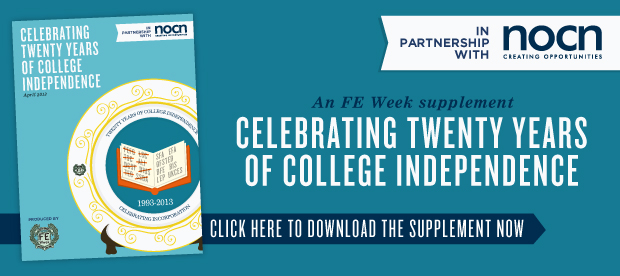Former hairdressing apprentice Jodie Whitemore (pictured right) is running her own salon at the age of 20 while completing a foundation degree at West Nottinghamshire College.
Just four years ago, she started her NVQ with no school-leaver qualifications and looked destined to add to the growing bank of NEET statistics. But Asha Khemka, her college principal, had other ideas with the creation of the Ashfield Centre aimed at capturing the likes of Jodie.
Nineteen-year-old Joseph Johnson (also pictured) is a similar entrepreneurial success story. While studying professional cookery at the college, he helped create the Forest Ferret company, producing and selling jams and preserves.
When Khemka launched the Ashfield Centre, she discovered that public funding would never meet the centre’s needs and so founded the Inspire and Achieve Foundation — a charity separate from the college — to fund it.
Based in former South Yorkshire coal-mining communities with severe cycles of inter-generational deprivation, the college had to act, she says.
In September, Khemka launches Vision Entrepreneur — a programme designed to support the job-creators of tomorrow — where enterprising students from the college and local sixth-forms will learn what it takes to succeed in business while hearing from inspirational guest speakers.
Similar initiatives can be seen springing up elsewhere, and not just for NEETs.
Among them is the Gazelle Group of 20 colleges, launched in April 2011, which its chief executive, Fintan Donohue, describes as “subversive” in intent.
“The group promotes the idea of entrepreneurial colleges as a disruptive influence for positive change in the purpose of colleges and the nature of their offer,” he says.
Technological change is rapidly replacing colleges and classrooms as the route to knowledge and skill”
Colleges have been striving for a more enterprising approach ever since incorporation — reaching out to the community, creating arms-length college companies which reinvest profits in learning, and franchising courses to reach people in the workplace, but they too often came to grief for overstepping the mark or being accused of using public funds for private training. But, more recently, it has been seen as quite respectable for colleges have come to the rescue of collapsed or failed enterprises, such as the Newcastle College Group takeover of Carter & Carter and Khemka’s own college appropriation of training company Pearson in Practice.
Several factors are forcing a change of attitude and approach, says Donohue.
“Traditional colleges and qualifications no longer provide the career opportunities they once did,” he explains.
“Young people are more open to the sort of entrepreneurship already established in countries like India and Africa. Technological change is rapidly replacing colleges and classrooms as the route to knowledge and skill. And the recent European Commission report makes entrepreneurial education its number one priority.”
This constitutes a far more generalised rather than utilitarian view of students being enterprising and entrepreneurial, he says.
“We need people who are ‘enterprising’ in all the dimensions of their life, not just about their career paths and financial investments,” explains Donohue.
For Sally Dicketts, principal of Oxford & Cherwell Valley College (a Gazelle member) the way to bring the best of the past and present together is through the creation of a learning company, where students are employed in real commercial operations as a significant part of their college experience. From September, business students will work in administration and marketing, media students will make films for local businesses, motor vehicle students will provide MOTs to paying customers and art students will develop community art projects.
A tutor-led and assessed programme taking 30 hours a week will combining work experience and individual study.
“At the end of their programme they can choose to work permanently in the learning company or with our own employment agency to gain employment or progress into higher education,” she says.


Your thoughts